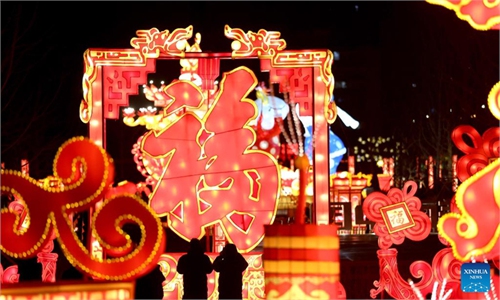
Tourists go shopping and enjoy the festive atmosphere on Yandaixie Street at Houhai, a scenic spot in Beijing on January 12, 2023. Photo: VCG
French wines, Belgian chocolate, Chilean cherries and Malaysian durian are among the products finding their way into Chinese shopping carts ahead of the Spring Festival which falls on January 22 this year.
The world's second-largest economy is bringing genuine benefits to the world as its consumer market is rapidly recovering, following the government's optimization of anti-COVID management.
With the free flow of people resuming, many products, especially imported ones, are selling well in China.
During a sales promotion held by e-commerce platform JD.com, which kicked off in December, Chinese consumers have shown strong appetite for imported fresh farm products. The turnover of Thai black tiger shrimp nearly doubled, and Argentinian beef nearly quadrupled compared with the previous year. Shrimps from Greenland are the best-selling frozen seafood this year, with sales up six times from last year.
"We have felt the revival of consumption as each household is actively preparing for the festival. Fruits rich in Vitamin C and multiple nutrients are popular," fruit producer Dole told the Global Times.
Yu, a Beijing-based white-collar worker, bought imported nutritional supplements for her parents at a Sam's Club over the weekend.
"People were swarming there, with their shopping carts filled with food. I saw a poster of Chilean cherries and bought some as the little red fruit matches the atmosphere of the New Year," Yu told the Global Times.
It's a hot selling season for imported fruits such as Chilean cherries, Malaysian durian and Thai mango, which topped the list in terms of year-on-year increases. Chilean cherries stood out with a year-on-year increase of 85 percent, according to a note that Tmall Fresh, Alibaba Group, sent to the Global Times.
As the Spring Festival comes earlier than usual this year, exports of Chilean cherries are sped up. Since China reopened its borders, the logistics chains and customs clearance process have improved, the Chilean Fruit Exporters Association (ASOEX) said.
On January 12, a cherry express vessel arrived in China's Dalian port for the first time, during which the ASOEX signed a memorandum of understanding with the Port of Dalian's operator, Liaoning Port Group, to enhance cooperation on cherry imports.
"Approximately 85 percent of all shipments of Chilean cherries to China will be distributed before the Spring Festival, with the remaining 15 percent to arrive after the holiday," the ASOEX said.
Thanks to the rapid development of supply chains, Chinese people, who now have higher requirements for the quality of food and beverages, could enjoy food from all over the world.
On the southwestern border, cargo trains via the Western Land-Sea New Corridor are busying transporting fresh tropical fruits to China.
On Tuesday, a train loaded with products from Southeast Asian countries including Indonesian shortening and Vietnamese dried bananas arrived at the Central Station of Tuanjie Village, Chongqing city.
After the Regional Comprehensive Economic Partnership Agreement came into effect on January 1, 2022, tropical fruits from Southeast Asian countries were massively exported to China.
"It is expected that after the Spring Festival, Philippine durians will be imported, and Dole is actively preparing," the company said.
China imported 1.57 trillion yuan ($230 billion) worth of agricultural goods last year, up 10.8 percent year-on-year, according to customs data.
"From the perspective of consumption upgrading, the proportion of imported goods still needs to be increased. There will be much scope for 'going out' and 'bringing in'," Zhang Yi, CEO of iiMedia Research Institute, told the Global Times on Wednesday.


